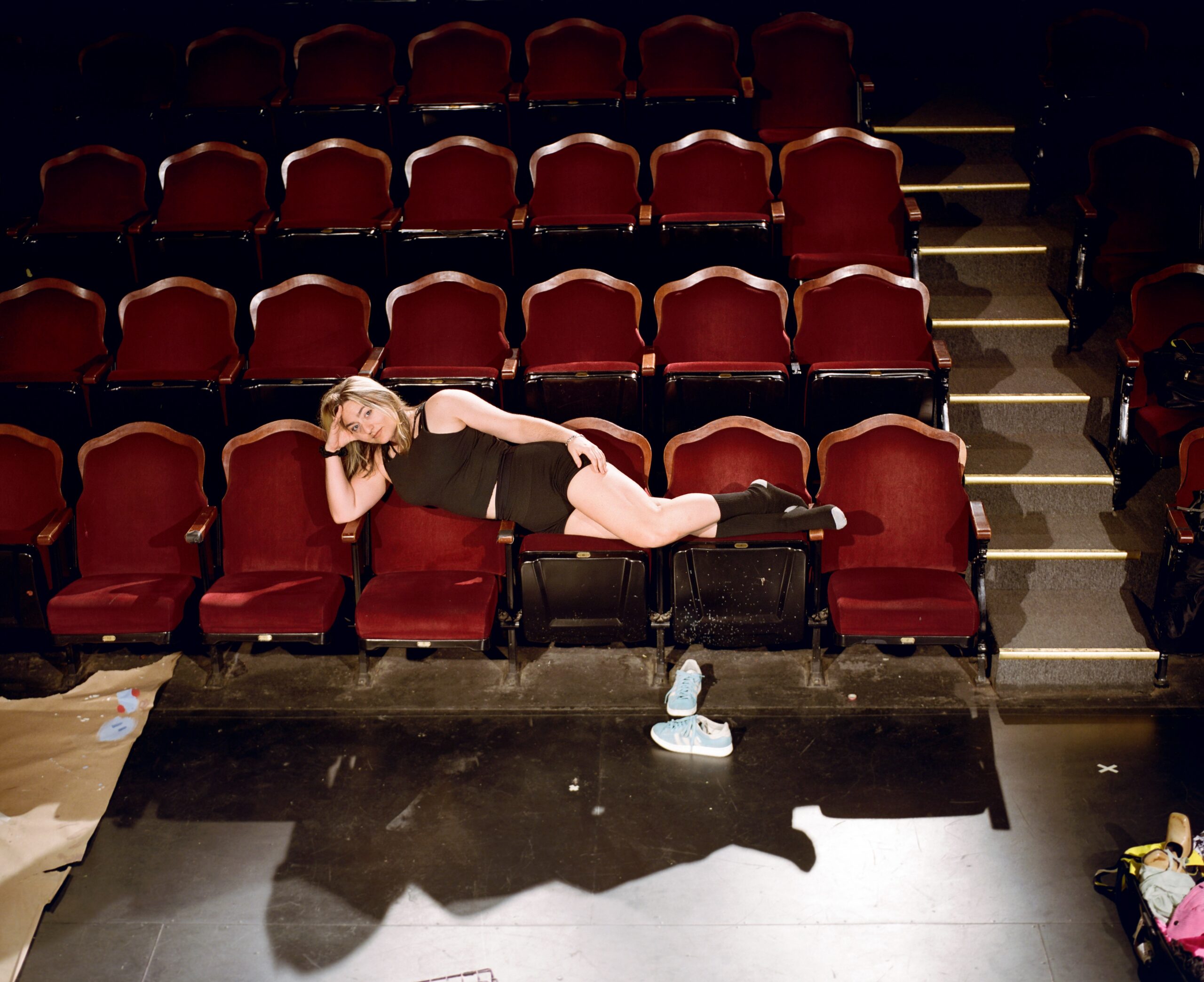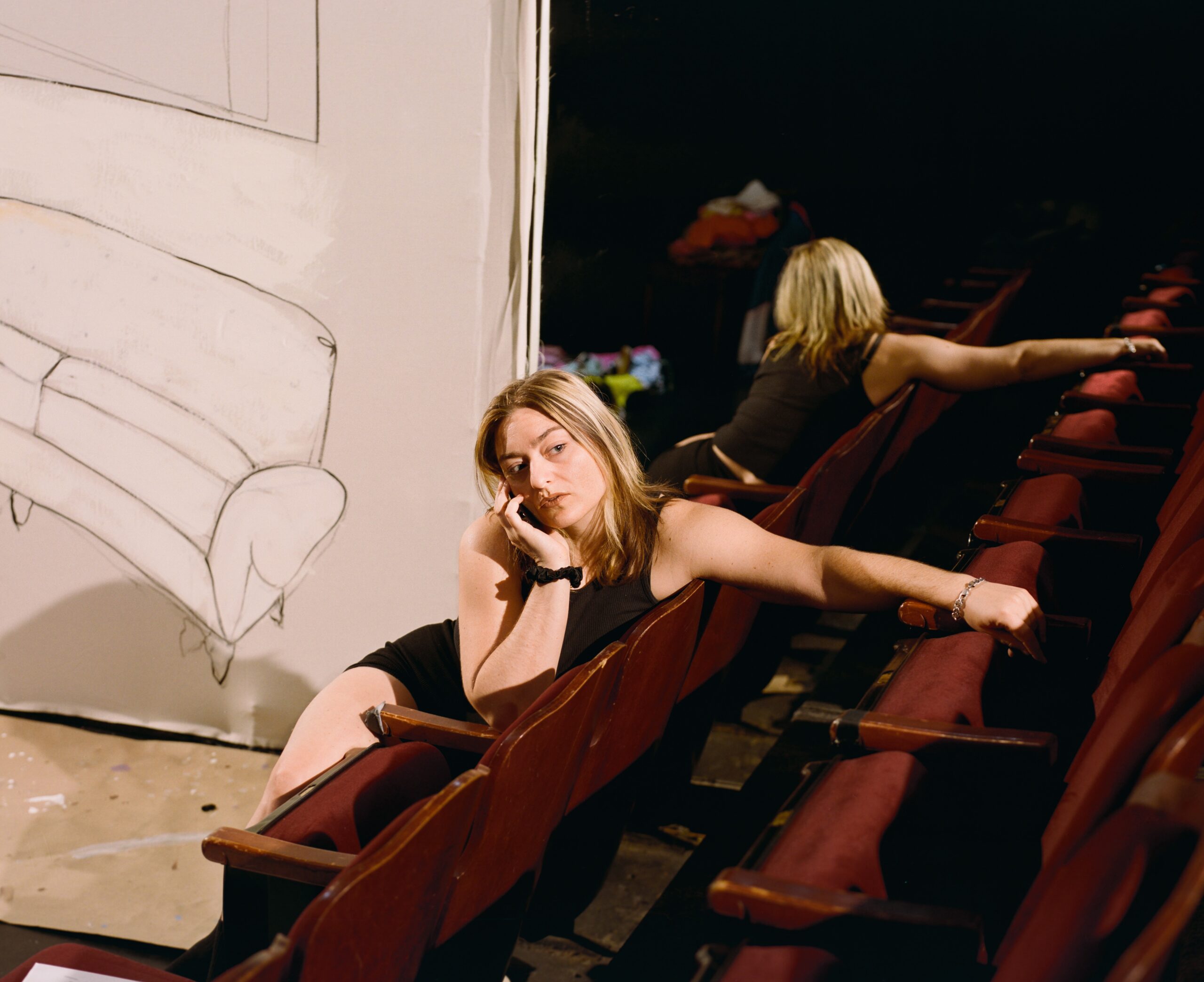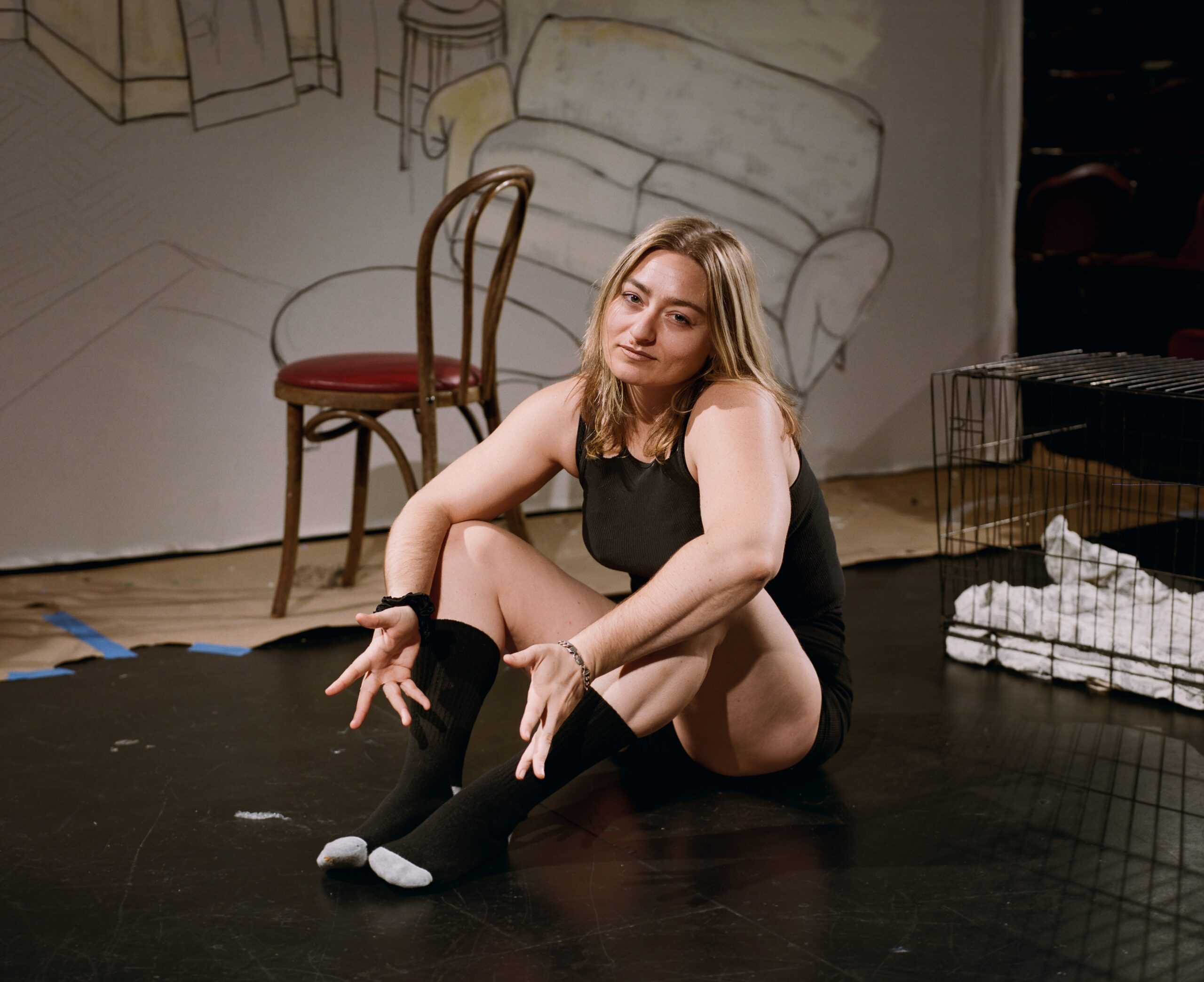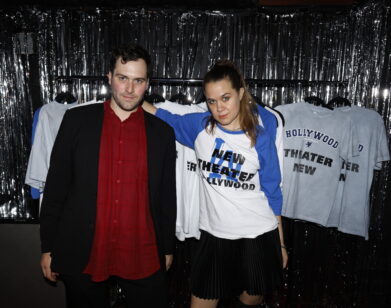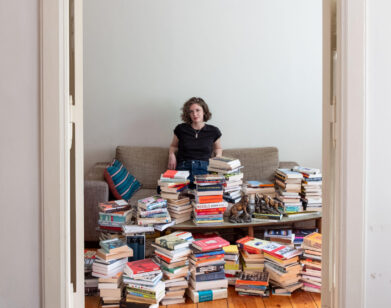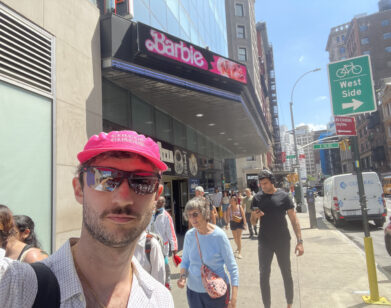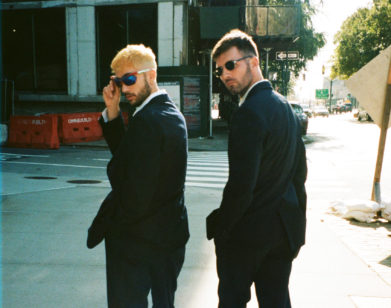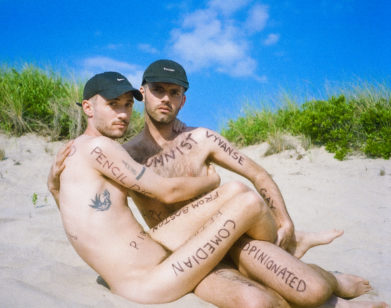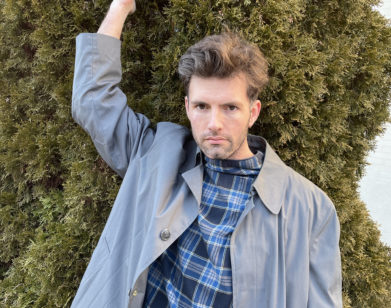BACKSTAGE
“Eyeliner Is Butch”: Casey Jane Ellison Takes Us Inside Her New One-Woman Show
Casey Jane Ellison took me to my first open mic night in, I wanna say, 2013. It was a basement in the East Village. The only audience members were also performers, mostly disheveled, myself included. I was shaking. I downed a tequila with lime. When I took the stage, fumbling for the mic stand, unsure of where to place my tequila—do I put it on the stool? What if I need to sit on the stool?—I could see Casey in the audience, her eyes gently narrowing, a soft lupine grin of approval. I did not kill that night. But I got a laugh, maybe two.
Casey invented me and she probably invented you, too. Dark girl, goth girl, plum lipstick girl, ironic, academic, self-aware—the girl who gets it. Standup, artist, animator, writer, actress. After her web series Touching the Art, which saw her interviewing Catherine Opie and wandering the halls of Basel, then her twin VFILES shows What the Fashion and Status Update, she sort of owned the comedy slice of post-Internet art, and was included in the 2015 New Museum Triennial. Now, she’s gracing us with It’s My Sister, a one-woman show in Los Angeles, playing at New Theater Hollywood this week. Just don’t call it a comeback. Or do.
———
STEVEN PHILLIPS-HORST: Hi, Casey.
CASEY JANE ELLISON: Hi, babe.
PHILLIPS-HORST: You look so beautiful.
ELLISON: Thank you. You look quite gorgeous, too.
PHILLIPS-HORST: I’m in my windowless hovel. You guys in L.A. are always just bathed in natural light and blond hair.
ELLISON: That’s all we have, actually.
PHILLIPS-HORST: I thought we could start by situating the reader a little bit and reminding them of your genius. I’ve been a fan of your work for pretty much ever. Touching the Art was brilliant, and it inspired so much of my early work. You had a VFILES showmand I was like, “Wait, I need a VFILES show.” So I guess my first question is, is this your comeback?
ELLISON: Oh my god. This is interesting, because I feel like in my pouting throughout the past years I was like, “I’m not gone. I’m right here.” But actually in the process of doing this show, I’ve realized that I did need time. I don’t think I was fully gone, but in my heart in some ways I was. I was just in a really bad mood. I was trying to figure some stuff out, and I was super pissed. Now, I’m still pissed, but I’m figuring out how to have fun with that, more consciously.
PHILLIPS-HORST: Conscious pissedness can manifest itself into work that lights fires. I don’t think you were gone either, but the concept of a comeback is interesting because, of course, it implies that there was a valley that we did have to hike our way out of.
ELLISON: Right, it’s exciting. I spent that time figuring out how to make stuff in a way that’s more realistic to who I am, without being so grossed out. Being actually curious and hopeful. My cynicism has always been a great brand, but I don’t want to ignore that cute side of myself.
PHILLIPS-HORST: Wow, I relate to this so much. I see you as my drag mother. You took me to my very first open-mic show, and you got me started on this crazy train that we call comedy.
ELLISON: And to your readers and your listeners, you’re welcome.
PHILLIPS-HORST: You have this wry critical eye—a metropolitan arched brow, one might say. So now, you have a one-woman show. I feel like the one-woman show has the connotation of mania. It’s always like, “One crazy lady, and she’s playing multiple roles. And we have to let her do this because she doesn’t have any other outlet.”
ELLISON: “This is feminism. Do not silence her.”
PHILLIPS-HORST: Is that just a sexist thing? “Women are crazy, so they need to do this.”
ELLISON: Well, I have to say, I have a lot of criticism for people who want to be on stage. But then I realized through the “time away,” I’m a Broadway baby. Every day I have to work through the part of me that hates that, but I actually adore “Defying Gravity.” I really do.
PHILLIPS-HORST: Wait, do you think Broadway is nerdy, or that the desperation for attention is humiliating?
ELLISON: All of it. The cliché is a trauma dump or a spiral through a one-woman show, but I actually love it. I directed Ruby McCollister’s one-woman show, Tragedy, last year, and that was what her show was about—a woman who had this gift and this curse. And she helped me realize that I love this, but I definitely have some kind of butch side that won’t let me be that.
PHILLIPS-HORST: Right, because to spiral is effeminate.
ELLISON: But it’s not butch. It’s controlling. I have to make something structural. So it is as close to a play as a one-woman show can get, but I would be honored to be compared to these hysterics.
PHILLIPS-HORST: I remember seeing Carrie Fisher in Wishful Drinking with my mom, and my mother, of course, is a classic mother-of-a-gay-man figure—she’s domineering and fabulous and loves alcohol. And seeing the show with her was such a gay experience. It was like, “Here’s a woman, she’s haunted by demons, and we’re all going to love that because we crave destruction.” But we also crave honesty. We’re jealous, even, of the vulnerability. There’s something pure and simple about it, and I feel like you’re getting at something more meta.
ELLISON: Which aspect are you referring to?
PHILLIPS-HORST: I don’t know, the structure of it all.
ELLISON: I’ll just describe what it is, okay?
PHILLIPS-HORST: I’m ready.
ELLISON: The one woman-show that I am doing is a phone call between two estranged sisters. They haven’t spoken in five years, since the worst thing that ever happened to them happened. This is their first phone call, and I play both sisters. It’s a really fun structure because the audience is eavesdropping on a phone call, so you only hear half the conversation.
PHILLIPS-HORST: Do you worry that a phone call itself is almost anachronistic in 2024? Did that occur to you?
ELLISON: Well, I literally am on the phone constantly. And by the way, let me just say, this bullshit—okay, sorry, I’m getting angry, but girls talk on the phone. Again, you’re being sexist. Do you not talk on the phone? I talk to you on the phone.
PHILLIPS-HORST: I know, you’re a phonist. You cold call. But you have to admit, that’s rare these days. You’re one of the few people who does in my life.
ELLISON: It’s interesting because I’m a cold caller, but people say that I’m a cold texter, emotionally.
PHILLIPS-HORST: You’re referring to how people text when they’re trying to signal warmth and conviviality by sending four texts in a row and maybe throwing in emojis and misspellings.
ELLISON: Sure, I get it. We need to placate each other in this way. But I feel like I can’t express my personality in this limited form.
PHILLIPS-HORST: I guess I have a nostalgia for a time of only phones, that true raw connection and emotion. I mean, it’s why we go to the theater. The theater is an anachronism, too, in some ways.
ELLISON: Oh my goodness, you’re right. I hate talking about this, but you’re making me do it. I think we are really hungry for live experiences, and we’re awkwardly stepping out and trying to emote and have feelings in public again. That’s why everyone’s obsessed with theater and Cole [Escola]’s moment.
PHILLIPS-HORST: Yes, it seems to approach some sort of truth that maybe we’re obfuscating. I saw Vanessa Redgrave as Joan Didion on Broadway in The Year of Magical Thinking, and I remember thinking that she made a terrible Didion. Vanessa Redgrave is this huge, booming woman, and Joan Didion is like a tiny bird.
ELLISON: I think that’s her right and her body positivity to do that.
PHILLIPS-HORST: I mean, she nailed the whole thing. But just as a casting choice, I feel like Didion is so spindly. She could just blow away in a gust.
ELLISON: Vanessa Redgrave is quite fit, if you’re insinuating something else.
PHILLIPS-HORST: No, I don’t think she’s of size. Okay, here’s what I’m going to say about plays. You’re right that they’re back, totally. I support the concept of your comeback, and I am trying to undergird it with as much evidence as possible.
ELLISON: Can you ask me questions that make people want to come to this show?
PHILLIPS-HORST: Good idea. Okay. Nudity, yes or no?
ELLISON: Look, theater is about living on stage, so you never know what’s going to happen. If I feel a certain way, I will have that experience on stage. It’s worth coming just to see what might happen, and what might accidentally happen too.
PHILLIPS-HORST: A nip slip. That’s going to get some asses in chairs. Intermission, yes or no?
ELLISON: Zero intermission.
PHILLIPS-HORST: Can I be really honest? Plays are almost always a little too long.
ELLISON: Okay, this is an hour tops, maybe an hour and two minutes. You’re going to be satiated. You’re going to be shocked. You’re going to laugh. You’re going to cry. You’re going to be home for dinner.
PHILLIPS-HORST: Audience participation, yes or no?
ELLISON: You guys need to laugh, you need to listen, you need to feel, you need to be present. But as I always say, no talking.
PHILLIPS-HORST: Are there going to be any selfie-tunities, as we say in the industry? Any photo ops?
ELLISON: Babe, I’m not the Museum of Ice Cream. I don’t know what you’re talking about.
PHILLIPS-HORST: But did you see Kate’s show? She had selfie-tunities in the last—
ELLISON: That’s true. She is the art comedian. I mean, I’m going to look great and you’re going to look great. It’s the theater.
PHILLIPS-HORST: If you want to take a photo—
ELLISON: Work, bitch.
PHILLIPS-HORST: What’s your favorite hair length on a woman?
ELLISON: It depends on what kind of woman. I love all hair lengths as long as it’s working, bitch.
PHILLIPS-HORST: I guess the segue here is that we talked about mania and these classic sexist tropes, not that the role of your play is to reify or collapse them.
ELLISON: No. Clichés are not inherently unacceptable. If you do it in a non-cliché way, love.
PHILLIPS-HORST: I had this thought the day after the election. I went to Sephora. It was crazy packed, and it felt like people were loading up on instruments of femininity. I was connecting it to the election. Is it some sort of return to conservatism?
ELLISON: It’s just a great pastime, and it feels amazing. People being femme is pretty rampant right now, no?
PHILLIPS-HORST: Yeah, femme does feel like it’s almost dominating all the other ones. I feel like butches are pretty femmey. I’m seeing a lot of 2003 Shane McCutcheon kind of butchness where it’s butch, but there’s eyeliner.
ELLISON: I’ve always thought that eyeliner is butch. I don’t even see that as glam rock.
PHILLIPS-HORST: A real man lines the eye.
ELLISON: But I’m living very left of center, clearly.
PHILLIPS-HORST: You live in a glam fantasy, you always have.
ELLISON: Yeah. But back to sisterhood, the idea of family to me is tough. When a family goes through something, it’s really hard. You often cannot count on your family, despite the cliché, so it’s a story about closeness and how far away that can feel.
PHILLIPS-HORST: Do you have a sister in real life?
ELLISON: I do have a sister. I’m qualified to speak on these matters.
PHILLIPS-HORST: Are you older or younger?
ELLISON: I’m younger. Do you see that?
PHILLIPS-HORST: I could. I see you as an older sister, but that’s just because you are my drag mother.
ELLISON: I’m younger than you, I think.
PHILLIPS-HORST: I know you are. Most people are younger than me, but I see them as older because I have this Peter Pan syndrome.
ELLISON: Are you the younger sibling?
PHILLIPS-HORST: For sure. I think that younger siblings are genetically more likely to be gay, but also because they’re spoiled, so they’re little bitches.
ELLISON: Mhm. But this phone call is about a lot of different people in my life. It’s definitely a fictional story, but personal.
PHILLIPS-HORST: I’ve been wanting to write a play recently, but I love fiction because you can do so much more exploring with it.
ELLISON: I just love how every time I say something, we talk about you.
PHILLIPS-HORST: But Casey, this play is about me.
ELLISON: It is. And that’s what I want everyone to feel when they walk out of this theater—that I was talking about them. I’m not even kidding. I want my work to transcend myself.
PHILLIPS-HORST: I think people’s natural inclination is to be like, “How is this about me? How is this my story? How is this my mother? How is this my sense of abandonment? How is this my Oedipal complex?”
ELLISON: Yeah, this one’s for you guys.
PHILLIPS-HORST: What’s your pre-play routine? Walk me through it.
ELLISON: I do a lot of yoga, a lot of private dance.
PHILLIPS-HORST: How private?
ELLISON: Well, that’s none of your business. No, I do a strip tease for myself.
PHILLIPS-HORST: Just like Demi Moore dancing to Annie Lennox in her bedroom in Striptease.
ELLISON: It’s very beautiful.
PHILLIPS-HORST: What’s your song?
ELLISON: “Red Light Special” by TLC. And then I like “You Sexy Thing.” A bat mitzvah-style strip tease.
PHILLIPS-HORST: There’s something so Tom Hanks about that, it’s really wholesome.
ELLISON: Thank you. And then all my obscure music.
PHILLIPS-HORST: Like 100 gecs and SOPHIE.
ELLISON: Yeah. But I think mainstream works better. Feeling too cool is a problem, it can really limit me.
PHILLIPS-HORST: And if cliché works, luxuriate in it. There’s a reason we all have this common reference. And these days, when people haven’t even seen Titanic, find that commonality.
ELLISON: Side note, I just went down a path internally of imagining being on the Titanic. Have you ever done that?
PHILLIPS-HORST: I did it a lot as a 12-year-old. Have you seen The Spy Who Dumped Me with Mila Kunis and Kate McKinnon?
ELLISON: I have not seen that, and it’s not relevant to my work, as far as I’m aware.
PHILLIPS-HORST: I think it could be. Kate McKinnon is the kooky friend, and Mila Kunis is dating someone. But then they become just a fab Laverne and Shirley. I do love accidental espionage, which, to me, is where the voyeurism comes in because you’re watching something that you’re not supposed to.
ELLISON: Well, in my one-woman show, you’re going to be hearing some crazy secrets.
PHILLIPS-HORST: This makes me think, now more than ever, everyone has a little bit of access to each other’s lives.
ELLISON: I think people are truly going through massive life changes constantly, and it is weird how the phone makes it feel smoothed over.
PHILLIPS-HORST: Well, this is why it’s good that you’re guarded. You can put all of your energy into your theater work and let it explode in front of an audience.
ELLISON: It is true. I do need a lot of privacy. Do you need a lot of privacy? No, not at all.
PHILLIPS-HORST: I do, though, more than people realize. People think they have access to me just because I have a podcast.
ELLISON: You only want privacy if it pays off in something else.
PHILLIPS-HORST: You think I am just an absolute horrible sociopath. Is there any act that isn’t selfish? Even the most selfless thing you can do still makes you feel good about yourself.
ELLISON: Yeah, like Phoebe said. Did you ever watch that episode of Friends?
PHILLIPS-HORST: That’s probably where I’m getting it from. I rip off Friends every day. Well, no one’s heard of it anymore, so I can.
ELLISON: What’s your favorite episode of Friends?
PHILLIPS-HORST: Finally, we’re getting to the good stuff.
ELLISON: Are we just inventing a podcast right now? Should we have a podcast about Friends?
PHILLIPS-HORST: Besides true crime, that is the number one podcast genre—rewatches of random shows. Our producer recently got reassigned to edit a New Girl rewatch podcast.
ELLISON: You know, I’ve been meaning to watch The Hills again. It was shot beautifully.
PHILLIPS-HORST: Not to be nostalgic again, but the way stuff looks now is so awful. You know [America’s Next] Top Model? I was just watching the most recent season and it looked like it was shot in an Amazon distribution center.
ELLISON: The original Top Model was literally a little set with one poster board.
PHILLIPS-HORST: Right, but I liked that rinky-dinkyness. Now it’s uncanny. All the girls are too normal and too self-aware.
ELLISON: I will not be quoted in Interview saying anything negative about Top Model. I know you’re a gotcha journalist, you’re a muckraker.
PHILLIPS-HORST: We’re trying to get some vital closure, Casey. Well, let’s be super positive here. What are your favorite pieces of theater?
ELLISON: Okay, I fucking loved Wicked.
PHILLIPS-HORST: Another show about sisterhood.
ELLISON: There’s a lot of plays that influenced me. I need to come to New York to see Oh, Mary! I haven’t seen it yet. But I saw this production called Fat Ham. It’s a remake of Hamlet, and it was delightful. And then I also saw Danny DeVito in that hoarder play [I Need That]. There’s a lot of time where he’s on stage just playing with things.
PHILLIPS-HORST: That is compelling.
ELLISON: If you were to cast me on a reality show, what show would it be?
PHILLIPS-HORST: Okay, I do like the idea of The Simple Life season four. You could really get into the coastal dryness, fish out of water kind of vibe. I like putting you in settings. That’s why I loved Touching the Art so much. When you’re surrounded by normies or freaks, you set them off either way.
ELLISON: I do.
PHILLIPS-HORST: And I think you throw everything into stark relief because you have such a truth that emanates from you. It can come off as cynical, but it can also come off as joyful. And that’s the tension we were describing before, this camaraderie you convey so instantaneously to an audience. They’re like, “Oh fuck, she gets it, she’s fucking real.”
ELLISON: It’s totally fake. I’ll never forget, after I started doing the VFILES Status Update, which of course you were on, all the kids were wanting to party with me. And I found myself in situations where I was like, “Oh no, I’m scared of that.” And they were like, “Whoa, Casey Jane Ellison is a dork?” And it’s like, not only am I a dork and afraid, but I also don’t like you. But I’m much cooler now, everyone knows.
PHILLIPS-HORST: “Your chill sister is back, and this time it’s personal.”
ELLISON: That’s right. Thank you. I should write that on the poster as the tabloid.
PHILLIPS-HORST: So how many days is the show running?
ELLISON: Four nights. It’s a run. And tickets are selling, not to brag, so I do want you to get tickets. You need to see The New Theater Hollywood.
PHILLIPS-HORST: I like that it’s physically in Hollywood and it’s completely undermining the cliché about L.A. being a creative backwater and completely commercialized.
ELLISON: You’re saying that as if it’s a negative. It’s a positive. L.A. is backwater, and it is a desert, and it is fucking weird and creepy, with the lipstick on the teeth. That’s cool. We’re not trying to do other things. We are weird out here. By the way, I’m from Hollywood, California, if your readers don’t know.
PHILLIPS-HORST: That’s really true, I’ve never heard it described. My whole family’s from there, and so I grew up going there as a kid all the time.
ELLISON: Wait, what do you mean?
PHILLIPS-HORST: Both my parents are from L.A.
ELLISON: Are you industry?
PHILLIPS-HORST: God, no. My grandmother moved from North Dakota in like 1907. She grew up in a sod house on the farm, and moved to L.A. with nothing but a dream.
ELLISON: A single woman?
PHILLIPS-HORST: A single woman. She had some address in her pocket, but it turned out it was the address of a brothel.
ELLISON: This is your play, babe. Then what happened?
PHILLIPS-HORST: She went into the brothel, and she turned one trick, made $25. And then she turned right around and came out. I guess the bus driver probably took her to some women’s hotel.
ELLISON: I think you should fictionalize it—and this is just me workshopping your family’s legacy—but maybe she stays at the brothel and becomes a madam.
PHILLIPS-HORST: Yeah, she works her way up.
ELLISON: I mean, can you imagine a brothel in the ’30s in Hollywood? Did Hollywood go through the Depression? I feel like L.A. never goes through anything that the nation goes through. We are fully isolated and insane. Except for right now.
PHILLIPS-HORST: Yeah, I’ve heard the industry’s contracting. Care to comment?
ELLISON: You said it all. But theater is booming in Hollywood.
PHILLIPS-HORST: The black boxes are boxing, mama.
ELLISON: They are. Oh, it’s also directed by Jos Howard Demme, who is a legend. Fabulous director, iconic New Yorker, and dog whisperer, he wanted me to mention.
PHILLIPS-HORST: I love Jos on a personal and professional level, so I’m excited to see how he surfaces your genius. I’m so ready for your comeback, not that you went anywhere. And I’m glad that my drag mother, who is younger than me, is going to be able to expose a new generation to theater in a new black box alley of Hollywood.
ELLISON: Work. I love you.
PHILLIPS-HORST: I love you too, Casey. You’re always changing my life, even when you don’t realize it.
ELLISON: I do realize it. I have a lot of work to do with you.
PHILLIPS-HORST: Thank you for making your whole life’s work about me.
ELLISON: Come see my show.


